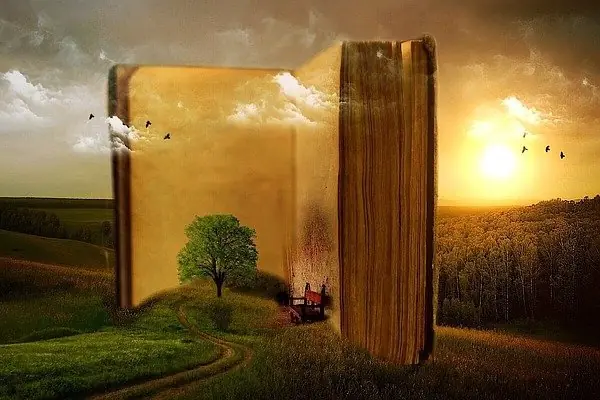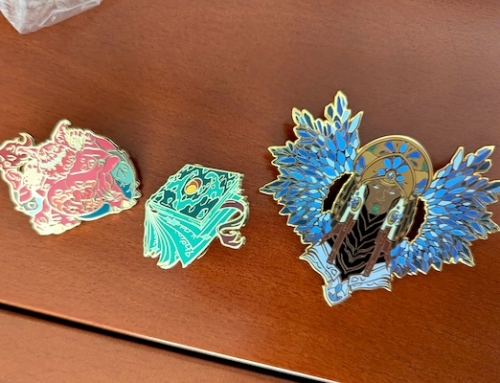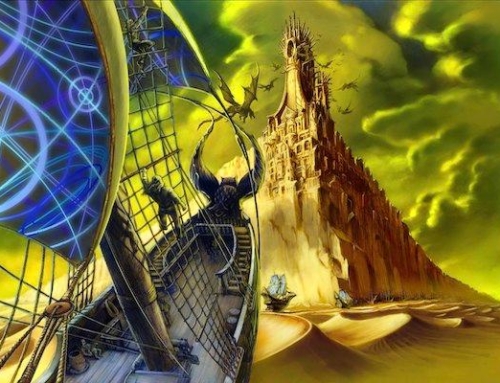
Or: Why I’ve Gained So Much More Respect for Tolkien and Translators Lately
I originally posted this on Reddit.
The study of etymology (the study of words, not ants) has been a bit of a curse to me as both a fantasy fan and author, because whenever I come across or use a word whose etymology I know or can intuit based off my prior knowledge, I immediately have to parse whether it makes sense there. Some words are just so tied into the history, culture, and evolution of a language that they just don’t make sense in fantasy novels. It throws me out of the story if it doesn’t makes sense, which, well, is really jarring. I could just stop studying etymology, I suppose, but that’s definitely not happening and there’s no point suggesting it.
When reading a fantasy novel and giving serious consideration to what’s going on language-wise inside the story, you’ve got to assume that the characters are either:
A: speaking English (or whatever language you’re reading the book in), or
B: Having their speech translated from their language into English (or, again, whatever language you’re reading in) by the author of the book. (Or, rarely, by a translator within the book who is acting as a narrator.)
So, let’s look at A: Everyone Speaks English, or at Least All the Good Guys Across the Multiverse DO
UGH.
English (or whatever language you’re reading in, but for shorthand, I’m just going to talk about English here) is not the default. It’s not like Esperanto, an ahistorical artificial language (also known as a conlang, or constructed language). English (and every other living language) evolves over time, and has a history just as involved and tied in with its people as any government, nation, culture, or artistic tradition. If history had gone a different way ⏤ say, the Spanish Armada successfully conquered England ⏤ the English language as it is spoken today would be a remarkably different beast. The American Revolution fails? The Black Death never happens? Same cup of tea. (This is probably a major reason why Esperanto failed ⏤ its lack of history makes it feel sterile and dead compared to a dynamically evolving language.)
So a fantasy world, even if it had the same linguistic starting point as our world, would end up with a remarkably different language, just based off their history. This gets even more exaggerated when you include loanwords, which I’ll have a whole rant about here in a bit. You know what? I’m going to have an Appendix on it, because unnecessary Appendices are the what’s best in life, Conan. Anyhow, even assuming the fantasy world had the same starting point, which is a huge assumption, it will change so much, so quickly. Hell, geography alone alters language massively ⏤ many of of our common words were once placenames (like agate, badminton, bikini, jeans, or volcano), and geography frequently determines how easily neighboring languages can intermingle with one another.
Just having everyone literally speak English is awful, lazy, and terrible, and yet authors definitely do it. Or they just put in a lazy universal translator spell that translates idiom directly somehow into English/ the fantasy language, and it somehow works perfectly! (Read: it’s just a lazy way to have everyone speak English.) Seriously, don’t even get me started on locals in isekai and portal fantasy that just use Earth (or worse, contemporary) idioms. That’s not to say a translator spell can’t work fine, or that portal fantasy is always bad at the language thing: He Who Fights With Monsters does a great job of having a sensible, intelligent translation spell that messes up hilariously with idiom and other colloquial language, while Delve does a good job of just, you know, having a totally different language in it. (Both are currently being published on Royal Road. I’ve got a weakness for webnovels, I admit it ⏤ I love any sort of serial entertainment with regular updates. Big part of the reason I love comic books, too.)
That being said…a lot of people are willing to give authors a bye when it comes to this whole thing, and there’s nothing wrong with that. This whole post is predicated on me being a giant dork obsessed with language and words, and there’s no shame to not being as pedantic as me. (It’s probably the less shameful path, really.)
Now let’s talk about B: The Author as Translator
When you’re assuming that all the characters are speaking in another language, and the author is just translating, well, it alleviates a lot of my previous concerns, and it’s the default assumption I go into any fantasy novel with, outside portal fantasy. This, however, brings us into the translator problem.
Translating a novel (or any long work) is a far, far more complicated task than simply looking up each word in a language dictionary and applying correct grammar changes. (Hence why there are often dozens of translations of many of the classics, and people fight about which to use.) First off, there are often cultural signifiers that one language has that another does not. There’s a lot of fantastic examples of this from Ken Liu’s top notch translation of Cixin Liu’s The Three Body Problem. If they were directly (or even loosely translated) they’d make little to no sense to us. Liu could drop them entirely, replace them with English phrases that convey a similar meaning, modify the text around them so they make more sense, or another such solution. He ends up just putting in footnotes, which I love, because of course I do: I’m a huge dork whose favorite author is Terry Pratchett, who uses footnotes liberally. It’s a brilliant solution, and one I advocate authors using far more often than they usually do.
Next, you’ve got the problem of words that simply translate poorly. In many languages (especially English) words can mean multiple things, resulting in having to figure out exactly what definition you should find a translation of, a task that can be more challenging than you might expect. There are also words with a standard translation, but the translated word carries implications that the original might lack, or vice versa, to the point where it could completely alter the meaning of the sentence. There are also words that simply don’t have a direct analogue, and that the translator has to invent a phrase that both sounds good and carries the intended meaning. (The wonderful Portuguese word desenrascanço is a great example of this, as are any number of ridiculous, absurdly long German compound words.) Grammar can also be a real kick in the ass for similar reasons. There’s no way to skip this problem: Two organic, historically evolved languages may never escape this sort of slippage in meaning between vocabularies. For two non-artificial languages to lack this sort of vocabulary ambiguity is frankly less likely than dragons and magic existing. Heck, it’s even less likely than nobody recommending Malazan in a book recommendation thread.
(There are a bunch of other reasons why translation is difficult, but that could be a whole book in itself.)
You can simply say, “I’m assuming the author is doing a good job as a translator, and I’m not going to worry about it,” which is totally legit, and I actually kinda envy that a little, because in that case you’re not a compulsive nit-picker like I am, and can just go enjoy the lovely weather outside while I’m ranting on the internet. (Well, if you’re living in or visiting the Southern Hemisphere, like I am. Hello from New Zealand! If you’re in the Northern Hemisphere, carry on.) If you’re like me, you start worrying about whether they’re doing a good job or not, and then eventually end up in the truly ludicrous position of whether an author might be an absolutely brilliant writer but a terrible translator for a language that doesn’t even exist except inside the narrative of their own books. For words with clear etymologies that come quite specifically from our own history, that becomes an especially problematic thing.
So let’s look at someone who does a great job of translating: J.R.R. Tolkien. (Side note: I just visited the Shire movie set last week, it was amazing, no one can prove I teared up a bit.)
Remember the early parts of Lord of the Rings, where Tolkien uses a bunch of really obviously early 20th century British references and languages that seem to clearly just not fit onto his carefully planned worldbuilding and entire languages that he’s constructing, and all the Hobbits just have really…bucolic British names?
That’s all deliberate obfuscation. Tolkien was doing that on purpose. He’s explicitly translating to an extreme degree. His whole conceit was that he didn’t write The Hobbit, The Lord of the Rings, or The Silmarillion. The hobbits have their own language that sounds totally different than English, and he’s not even giving us the hobbits’ real names. Samwise is actually Banazîr, Frodo is actually Maura, Peregrin is actually Razanur, Meridadoc is Kalimac, and Bilbo is…Bilba.
Tolkien is, in essence, translating very loosely or liberally from Hobbitish into English, concerning himself more with the tone, flavor, and content than with strict translational accuracy. It’s a brilliant, albeit audacious strategy, especially for translators who aren’t the original authors. (And recall, Tolkien’s conceit in the books is that he is simply a translator, not the actual author ⏤ he’s just translating the writings of Bilbo, Frodo, Sam, etc after the original events.) You there face the risk that by translating liberally in an effort to get closer to the meaning, that if you misinterpret said meaning, it could result in far greater errors than might crop up from stricter translation styles more concerned with literal translation. (It’s a bit of amusing conjecture on my part that Tolkien was deliberately writing as an only semi-reliable translator of, in turn, semi-reliable hobbit narrators, who often themselves might be getting information from semi-reliable narrators. Are Gandalf and Elrond really telling Frodo the whole story? Who knows?)
Literally every objection I’ve raised here, every problem, every thought, Tolkien already anticipated and overcame. The more and more you learn about him, the more brilliant his accomplishment becomes.
Get to the Point, John, We’re Dying of Old Age
So am I saying that authors should all compulsively worry about their word choice in relation to the language problem like Tolkien did? No, it’s an arguably Sisyphean task, and writing already has more than its fair share of those. This is even without including the whole actually inventing multiple new languages bit, which is actually just insane. It’s a task that most certainly slowed down Tolkien, even with his more liberal translation style from Hobbitish into English. If you do it, though ⏤ if you try to follow in Tolkien’s steps to deal with the Fantasy Language Problem, even with a totally different solution than he used ⏤ it’s well worth praise. Taking that level of care with your language is wonderful, and I’ll adore you for it. (Here’s looking at you, Rothfuss, Jemisin, Hobb, and Le Guin.)
There are, honestly, other paths to walk than those I’ve listed. One example is the deliberately anachronistic path that satirists like Terry Pratchett often take, where you purposefully crash right through the language problem, in their case often for laughs. It’s also present as a stylistic feature in works like Final Fantasy, which embraces anachronism on literally every level, not exclusively the linguistic, like it’s a life raft, and is part of why many of us love those games. (Also Final Fantasy influenced books like Travis Riddle’s Balam, Spring.) Some New Weird and New Weird descendant authors do it as well, because of course they do.
The fantasy language problem is most certainly a lens that I look at my own writing through as well. I’m definitely nowhere near those brilliant authors who’ve confronted and bested the whole fantasy language problem. Looking back over my own writings, I often cringe and think “Wow, I really should have shaped my prose more carefully there.” Well, I think that for more reasons than just the fantasy language problem, of course, but that’s another topic. (I can never decide whether to feel suspicious of writers who don’t hate reading their own writing, or collapse into a heap and just go “of course you don’t, you’re amazing and I want to be you.”) There are so many points in my own writing where I just get so damn upset at my word choice for this very reason. Do I think I can develop sufficient care and skill with language that I can beat the fantasy language problem like some of my idols? I don’t know, but I hope so.
There’s a happy medium to find here when it comes to how much time to worry about the fantasy language problem, I think. You certainly don’t need to beat the fantasy language problem to the rigorous academic satisfaction of linguists. You definitely can’t please everyone all the time, or even most people all the time, and, honestly, nerdy, detail-obsessed pedants like me aren’t the people you should be worrying about if you want to sell books. Hell, I’m not the type of person that I should probably worry about if I want to sell books. But I don’t worry about this stuff because of sales figures. I worry about this stuff because I love it.
Appendix A: Puns
Holy crap puns are a problem. Puns play on linguistic ambiguities within a language for comic effect. They’re the form of joke most closely tied into specific languages, and they’re damn near impossible to translate literally, especially the ones most closely based off homophones, or words that sound the same while having different meanings. When actual translators come across them, they have a real challenge on their hands. Most commonly, they just try to replace it with a pun of similar intent, or a similar quality pun, in the new language, dropping any attempt at direct translation. When I stumble across a pun in someone else’s book, I just pretend that’s what’s going on. When I’m writing…I gotta be honest, I’ve actively avoided puns before because I couldn’t make myself believe that’s what I was doing, because I’m too damn literal and too self-critical about this stuff.
Appendix B: Etymological Obviousness
Some words and phrases have an etymological origin that’s simply so obvious, it will throw anyone out of the story. This is especially common in names. I’m planning a future project with a lot of trees in it, and, well, to pick a random example of trees I’ve researched, putting a Japanese Larch into the story isn’t really going to fly for anyone, since Japan doesn’t exist on that world. That’s an extreme example, but some names, phrases, and words are just so obviously not of the fantasy world in question that they’ll break immersion immediately. Deciding where, exactly, that line lies is one of the most challenging tasks involved in the Fantasy Language Problem. It’s really just one end of the spectrum of the whole word choice problem involved in the Fantasy Language Problem. (Important note: Acronyms basically always fall under this category.)
Appendix C: Loanwords
I did promise this appendix! A loanword is any word a language uses stolen from another language. English does this especially often, hence its well deserved reputation for mugging other languages in dark alleys and rifling through their pockets for loose vocabulary. (I actually finally found the correct source for that joke today!) Common loanwords in English include cafe and genre from French, fest and kindergarten from German, glitch and schmooze from Yiddish, etc. Well-absorbed loanwords, like chocolate (from Nahuatl by way of Spanish) aren’t going to cause a problem for readers. Less well absorbed or integrated loanwords, like hors d’oeuvres, are, however, more likely to cause a problem, potentially jarring readers out of a story. It’s no less of a French word than cafe, but it’s less well absorbed. (And the spelling is bizarre, even by the schizophrenic standards of English.) Likewise, plaza is much less likely to throw up alarms in a reader’s head than siesta. Both are equally Spanish, but plaza is much more fully integrated into English, while siesta’s…I dunno, maybe a third of the way there, to throw out a complete guess? Anyhow, you need to be a little cautious when using loanwords. I’m currently battling over whether I should use the poorly integrated French loanword boulin, the proper name for the cubbies in a dovecote, or just call them cubbies in a dovecote, which I kinda hate, in my current novel.
We’re not even going to get into calques. Nope, not happening.
…Fine. Long story short, it’s where a word or phrase is directly translated into a language root-for-root, then becomes part of that language. Skyscraper, for instance, is translated into all sorts of different languages in variants of “sky-scraper,” “sky-kisser,” “cloud-breaker,” etc., in their own language. When people talk about “computer mice,” they don’t say “mouse,” they say their language’s word for mouse. Flea market is the reverse: It’s a translation of “marché aux puces,” more literally “market with fleas.” Calques are…of moderate utility to a writer at best, in my opinion, if they’re not building a conlang, and most are probably unlikely to jar readers out of a story ⏤ or even be noticed. (I could certainly be persuaded otherwise, of course.)
Appendix D: Units of Measure and Directional Systems
Translating units of measurement is a challenge all its own. Different cultures/ languages have different units of measure, often multiple ones. Take, for example, the li, a Chinese unit of distance that today is half a kilometer, though historically has been more variable, usually about a third of a mile. It was originally a measure of effort used to traverse a distance, not the distance itself. (Li is also, confusingly, used to be the name for another unit of distance in Chinese that was 1/1000th of a chi, which was 1/1500th of the bigger li. Today, the smaller li is equivalent to the centi-prefix. It’s not confusing in Chinese, because it’s a tonal language.) When you’re translating Chinese fiction to English, you can just try to indicate what a li is by context clues, just translate the distance in miles, or try any number of other solutions. Tao Wong, in his Thousand Li series, just used footnotes to explain. I love footnotes, did I mention that? Similar issues are present with units of measurement in lots of other languages. (Seriously, imagine trying to explain how far a mile was to someone who didn’t know what they were. Or…I guess a kilometer, if you’re not a backwards American like me.)
If you’re not dealing in modern day levels of precision, you also have to take into account that most historical measurements have been really inaccurate, and vary wildly not only from kingdom to kingdom, but from one village to the next only a hour away, often by two hundred percent or more. There’s a truly fascinating history behind how measurements have been standardized over the centuries, usually by governments trying to enforce stricter tax laws. Some historical empires have had more consistent measures ⏤ usually enforced from above ⏤ as far back as the Harappan Empire, Indian subcontinent trading partners and contemporaries of the Sumerians ⏤ but by and large, most didn’t. (And as far as the Harappans go, many are historians pretty sure they had a consistent measuring system based off their super uniform construction, but nobody can translate their writing, so that could definitely be wrong.) So when you’re dealing with units of measurement in your writing, you should be making a conscious choice whether to have reliable units.
Then, of course, you have all sorts of fun regional colloquial variants in measurement that aren’t based in strict units of measure ⏤ like the old version of li mentioned above. In the American Midwest, for instance, if you ask how far away something is, you’ll get an answer in time, not distance. Landmark based measures of distance are common everywhere ⏤ “it’s just past the old barn, you can’t miss it”.
Then there are directional systems. The Maori name their directional systems based off the winds that come out of them. It’s not perfectly analogous to N/E/S/W, from what little I’ve found on it so far. (That’s a severe oversimplification of their directional/ navigational system, and I’m definitely not qualified to explain any of them.) Marangai, for instance, which is East/The East Wind, also means Storm or bad weather in some regions, but means North/The North Wind in other regions of New Zealand, based on what direction storms come in from. This doesn’t have the exactitude we demand from our system, but it carries significant practical information that ours doesn’t, and, I’m guessing, was probably much more useful for pre-Western Contact Maori than our system would have been. Translating it simply to N/E/S/W would not only be a simplification on both mythic and practical levels, but levels much of the system’s beauty ⏤ seriously, naming directions off the winds that come out of them is absolutely gorgeous. The Piraha tribe of the Amazon (who basically broke the science of linguistics in half, they’re so linguistically unusual) have a directional system based off the river: Upstream, downstream, towards the river, away from the river. (Their language also effectively prevents them from choking to death on food!) While systems like this are a little extreme, there are quite a few variations in how different languages describe direction. It’s definitely worth considering how your directional systems fit into your language, though it’s also very much its own worldbuilding topic.
John Bierce
2 Comments
Comments are closed.





Oh awesome post. It’s lovely thinking about these topics. I’m working on some loosely connected short fantasy stories that must deal with this language problem. I basically shot myself in both feet- 1. none of the protagonists know the language of the cities they are moving to and neither does the reader 2. No other dialogue is translated either. Am I dumb or just lazy? Probably both. It’s a lot of fun so far, in a masochistic kinda way.
I’m looking for more stories that do something similar.
Ouch, sounds like a challenge! A lot of fun as well, though! Have you actually invented the other language, or…?
Have you read China Mieville’s Embassytown?